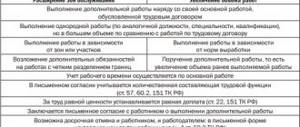02.07.2019
0
30
5 minutes.
The rights and obligations of employers and employees are regulated by federal law. Company managers have the right to draw up internal regulations to regulate labor activities and business relations within the team of a separate enterprise. Legal documents do not establish a mandatory list of local provisions. The director independently develops internal rules.
What are local regulations
The actions of the manager are regulated by the code. Employers can create documents within the organization containing labor law standards based on federal laws and a collective agreement. The approved legal rules apply to all employees, regardless of their position. According to Article 8 of the Labor Code of the Russian Federation, individuals who are not individual entrepreneurs should not draw up local documents. Primary requirements:
- approval of acts by the head of the company alone or in the presence of a trade union representative;
- the impossibility of worsening working conditions in comparison with other laws;
- familiarization of subordinates with approved documents against personal signature;
- mandatory compliance with the terms of the enterprise’s acts.
The forms of documents are regulations, rules, instructions. Regulatory acts recognize the staffing table and employee vacation schedule. A collective agreement is a different type of legal instrument. Common varieties:
- protection of personal information;
- wage system;
- internal regulations;
- instructions on labor protection, fire safety;
- employee certification.
It is important to know! The law does not define a list of local securities. The adoption of acts is determined by the specifics of the company’s work and the categories of employed employees. Optional documents, the approval of which is carried out by decision of the boss, are the regulations on voluntary insurance and instructions. Legal papers adopted at a particular enterprise are aimed at unifying processes in the organization and streamlining social relations.
According to the scope of action, local regulations containing labor law norms are of general and special purpose. Broad-based documents regulate business relations between the employer and employees. Narrowly focused papers regulate certain issues that concern a limited category of subordinates, for example, regulations on certification, structural divisions, instructions for relationships with clients. Local acts of indefinite and precise duration are distinguished. The first category of documents, which have legal force until the repeal or adoption of new provisions, takes into account changing working conditions for timely regulatory regulation. A document with a certain validity period includes a vacation schedule.
How to distinguish local regulatory documents from other personnel documents
The employer’s ability to independently adopt local regulations is discussed in the article of the Labor Code, according to Part 1 of which organizations and individual entrepreneurs have such a right.
However, this article does not contain a definition of a local regulatory act, noting only that they must necessarily contain labor law norms. Actually, it is this clarification that allows us to separate local regulations from other personnel documents issued by the employer. After all, a rule of law is a generally binding regulation of a permanent or temporary nature, designed for repeated application (clause 2 of the appendix to the Resolution of the State Duma of the Federal Assembly of the Russian Federation of November 11, 1996 No. 781-II GD).
Based on the above quote, we can define a local regulatory act. This is an internal document of the employer (organization or individual entrepreneur), which is designed for repeated use. It establishes the rights and obligations of both the employer himself and his employees (either all or certain categories) in that part of labor relations that is not directly regulated by labor legislation.
The fact that this document is designed for repeated use is what distinguishes local acts from other personnel documents drawn up by the organization. Thus, various orders (on hiring, dismissal, transfer, bonuses, sending on a business trip, etc.) are used only once in relation to a specific employee in a specific situation, and are not designed for repeated use. That is why an order, say, on hiring does not apply to local legal acts, although it establishes rights and obligations. Such an order is an act of application of law.
But, for example, the regulations on bonuses, or the regulations on business trips are acts that can and should be used every time when assigning a bonus or when sending on a business trip. Moreover, the employer can apply these acts to any employee at any time. So these documents are definitely designed for repeated use and establish mutual rights and obligations of the employer and employees. This means that the provision on bonuses or business trips can serve as a classic example of a local regulatory act.
Compose HR documents using ready-made templates for free
Employer's powers
The boss independently creates a local act. To enter into force, the consent of the representative body of employees is required if this condition is reflected in the collective agreement. Before approval, the director sends the project with justification to the trade union. If the decision is disapproved, the employer has the right to draw up a protocol, on the basis of which a regulatory document will subsequently be issued. The legal response of a representative body is to contact the inspectorate to carry out an inspection.
Examples of local acts
Documents of local importance are distinguished by a strict form of completion. Before drawing up, employers should be aware of what local regulations are that contain labor law standards for proper execution. The structure of a regulation approved at a separate enterprise includes general issues, the main part, a conclusion, and an appendix. Mandatory information that must be reflected in the local document is a reference to the laws, a list of categories of employees responsible for execution, the rights and obligations of the manager and employees, the scope and duration of validity, the period of entry into force, the procedure for making changes.
Vacation schedule
A document indicating the rest period for the director and subordinates is drawn up two weeks before the start of the new calendar year. The act is drawn up after agreement with the employees of the enterprise. Spouses of military personnel, part-time workers, minor citizens, honorary donors, husbands of women on maternity leave have the right to choose a convenient vacation time when submitting a letter. The document is approved by the head of personnel, the head of the company or an authorized person. Basic information in the chart:
- structural subdivision;
- list of employees indicating position;
- number of rest days for each employee;
- vacation start dates;
- additional or postponed rest period for the past calendar year;
- consent of subordinates to share the time of removal from official duties.
The employer has the right to independently draw up a vacation schedule or use the unified T-7 form. The form must have fields for making changes. In separate lines, you must indicate the actual and expected date of the employee going on vacation, the basis for postponing the vacation with reference to the resolution. To approve a document, the issuance of an order is not required. Subordinates must be familiar with the drawn up schedule without fail. Validity period – 1 year.
Staffing table
The regulatory document determines the structure, personnel composition, and size of the organization. The staffing table is intended to assess the effectiveness of employees, workload, and changes in job descriptions. The employer has the right to independently draw up a local act or use the T-3 form. Mandatory information when filling out:
- department name;
- employee positions;
- number of staff units;
- the amount of salary, tariff, bonus.
The schedule is certified by the accountant and the head of the personnel department. Approval of the document is within the competence of the general director of the enterprise after issuing an order in free form. A local act is drawn up when opening a company. After the relevant resolutions have been issued, it is permissible to make changes when renaming structural units, reducing or increasing salaries, reorganizing the institution, or reducing the number of employees. The validity period is not regulated by law.
Inner order rules
Coordination of employee activities is necessary to ensure a smooth work process, strengthen discipline in the team, and rational use of working time. A local act drawn up by the head of the enterprise or an authorized person is confirmed by an order. According to Article 189 of the Labor Code, all citizens employed in the organization must comply with the rules.
Mandatory information:
- rights, obligations of the employer and employees;
- working period regime;
- start and end times of work, breaks;
- rest days;
- incentives, disciplinary sanctions;
- liability for violation of labor discipline.
Advice! The work schedule must include a list of positions with irregular work schedules and the duration of additional leave. The employee must be familiar with the local act upon employment. The validity period of a normative document is not limited by law.
Regulations on remuneration
An internal act of the organization is approved to describe the calculation system used, monetary remuneration, establishing the procedure for calculating incentive bonuses and material incentives, and justifying the established tax rate on the monthly income of employees. The legislation allows not to formalize the provision if the terms of payment are specified in the labor and collective agreement or employees carry out activities without overtime, holidays, or night time. Company managers have the right to independently determine the form and content of the regulatory document. Basic information of the local act:
- wage system;
- rates;
- official salaries;
- term, place, form of calculation of monthly profit;
- employer's liability for delays in funds;
- the procedure for paying allowances, compensation, bonuses, vacation pay, temporary disability benefits, and financial assistance;
- pay slip form;
- salary indexation.
The law does not define restrictions on the validity period of a regulatory document. The employer has the right to approve the position once without making changes. Amendments are permissible when supplementing basic and incentive payments.
Other
Local regulations in labor law are documents approved separately in each organization. A general provision for enterprises where individuals work is fire safety instructions. A set of rules and actions is necessary to ensure the safety of company property and the lives of employees. The document is written in free, simple language. Basic information:
- measures to maintain the level of fire safety at the enterprise;
- actions of workers upon detection of a fire;
- number and location of permitted smoking areas;
- location, maintenance, arrangement of emergency exits;
- procedure for operating electrical appliances and equipment.
Labor safety instructions are developed separately for certain categories of employees or types of activities. The document is approved by the head of the enterprise after the approval of the trade union, technical safety service, chief mechanic and power engineer of the company. The local act specifies information about the operation of equipment, methods and techniques of labor activity, hazardous production factors, the procedure for notifying superiors about an employee being injured, providing first aid, the algorithm of measures for checking source materials, the serviceability of devices, and eliminating an emergency situation. The instructions are valid for 5 years.
More specifically?
As we have already said, there is no exact list of local regulations, and there is no indication of which of them are mandatory. This is the main difficulty of working with personnel documents.
Conditionally mandatory ones can be distinguished. These are those whose presence is prescribed in the Labor Code; they are most often requested by supervisory authorities during inspections. These LNAs include Internal Labor Regulations (Article 189 of the Labor Code of the Russian Federation), Regulations on the processing of personal data of employees (Article of the Labor Code of the Russian Federation), Regulations on labor protection (Section X of the Labor Code of the Russian Federation).
However, there may be several ways to formalize the requirements of labor legislation, hence the variability in the list of documents. For example, the Labor Code of the Russian Federation stipulates the requirement to identify the main labor functions when hiring a person. The employer can do this in two ways: write them into the employment contract or familiarize the new employee with the job description.
In addition, the specifics of the activity of the enterprise or certain categories of its employees are of great importance: work requiring a mandatory medical examination, activities related to trade secrets, etc. In such a situation, determining which documents are mandatory for the employer and which are optional is very important. difficult.
Below is a list of local regulations that employers must/can use to regulate labor relations with employees. These are general documents that apply to the entire team or certain categories of employees:
- Internal labor regulations (Article 189 of the Labor Code of the Russian Federation).
- Regulations on trade secrets (Federal Law of July 29, 2004 No. 98-FZ “On Trade Secrets”).
- Job descriptions (letter of Rostrud dated 08/09/2007 No. 3042-6-0) - the document is needed if labor functions are not specified in employment contracts.
- Regulations on remuneration of workers, Regulations on bonuses and material incentives for workers (Section VI of the Labor Code of the Russian Federation).
- Regulations on the processing of personal data of employees (Article 86 of the Labor Code of the Russian Federation).
- Regulations on labor protection (Section X of the Labor Code of the Russian Federation).
- Instructions for electrical safety, fire safety and labor protection (Section X of the Labor Code of the Russian Federation).
- Staffing table (Resolution of the State Statistics Committee of Russia dated January 5, 2004 No. 1).
- Vacation schedule (Article 123 of the Labor Code of the Russian Federation, Resolution of the State Statistics Committee of Russia dated January 05, 2004 No. 1) - points of view on this document differ, we will explain the situation below.
Please note that job descriptions have been compiled on the basis of ETKS for a long time. The process of approving professional standards is currently underway. For certain professions they are already mandatory. In other cases, professional standards can be a good basis for developing job descriptions.
The list of local regulations can be supplemented with provisions on vacations, business trips, personnel certification, etc. in accordance with the needs of the employer.
The Labor Code of the Russian Federation also leaves a wide field for interpretation in relation to staffing. The employer is not obliged to familiarize the employee with it, however, the letter of Rostrud dated May 15, 2014 No. PG/4653-6-1 states that the staffing table is still included in the group of local regulations. The same situation occurs with the vacation schedule. In any case, the manager must remember that these are mandatory personnel documents, their availability is determined by the requirements of federal legislation.
Build staffing and vacation schedules in the Kontur-Personnel program.
To learn more
Very often, local regulations of the employer include collective agreements and industry agreements, meanwhile Ch. 7 of the Labor Code of the Russian Federation directly indicates that they are legal acts and regulate social and labor relations.
Acceptance procedure
Regulatory documents are developed by the manager with the involvement of specialists, agreed upon with trade unions and experts from higher organizations, approved and put into effect. The acceptance algorithm may be changed if otherwise provided by internal regulations. The document comes into force after the relevant resolution is issued. The order must indicate the date of entry into force of the normative act, the timing of familiarization of employees with the situation, and the details of the responsible persons. The employee must study internal documentation and put a personal signature.









